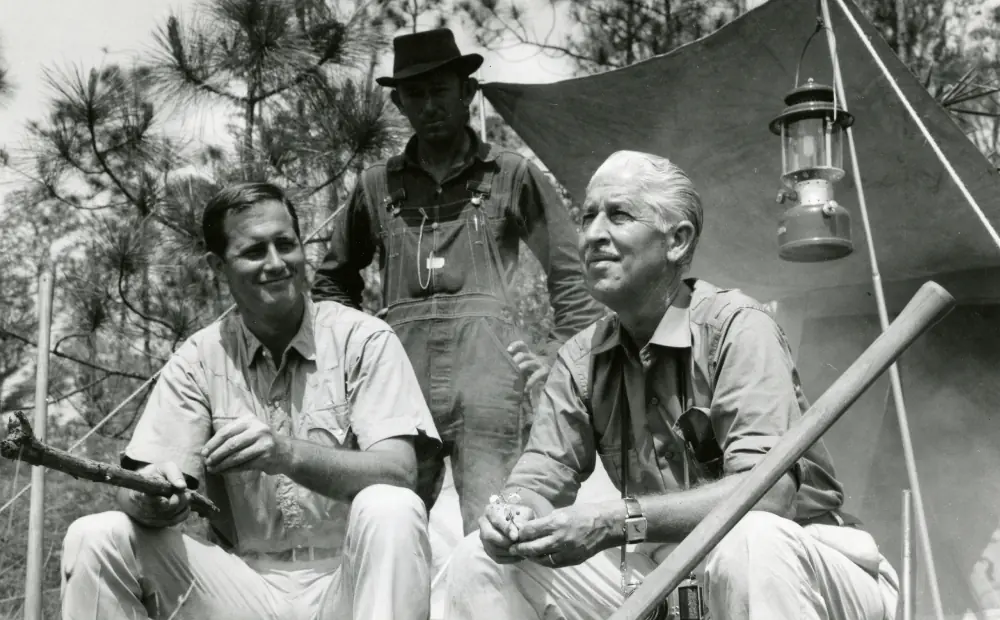0:01
For Dr. Rae and I, the best part of our jobs is releasing animals back to the wild.
0:06
Off you go, back to the ocean where you belong.
0:09
I hope you come back here and lay lots of eggs.
0:16
Along the way, we've worked with dedicated people who are fighting to protect our most vulnerable species.
0:23
Thank you for your service in the name of science.
0:26
And off you go.
0:27
There you go.
0:30
When injured animals are rehabilitated and returned to the wild, it's a soaring achievement we can all celebrate.
0:39
Being able to open that door and see that animal fly away or run away or swim or whatever it's going to do is really wonderful feeling.
0:46
Oh, look at that.
0:49
That's really special.
0:54
Today, our mission is a critical one as we help save 2 orphaned bear Cubs who are in the fight of their lives.
1:02
Their story begins with a raging wildfire in the Cascade Mountains of Eastern Washington.
1:09
A local couple had discovered on their home security camera two orphaned bear cubs were in serious trouble.
1:16
It was the next day after the fire had actually gone through our place.
1:22
One bear was walking in the yard on its knees.
1:26
Actually, he couldn't walk.
1:28
They lost their mother.
1:29
Their mother died in the fire and there was no food for them.
1:32
They came to our bird feeders and they were crawling under our bird feeders, licking the ground for a seed.
1:39
That's all they had to eat.
1:40
We immediately called wildlife folks and they sent up a representative and put a trap out and took them over to pause.
1:48
Just outside Seattle, WA, the PAWS Wildlife Center rehabilitates and releases about 1000 local animals each year.
1:58
The team at PAWS are no strangers to treating injured and orphaned bears, but the traumas caused by a wildfire were challenges they had never before faced.
2:08
We haven't had animals brought in from wildfires.
2:10
It was really pretty heartbreaking to see these Cubs come in with such significant injuries.
2:16
The bears were suffering from smoke inhalation and 3rd degree burns, most severely to the very thing that give them mobility, their paws.
2:27
They had really substantial burns on all four of their feet, particularly the hind feet, and they required really aggressive, pretty regular wound management for the first couple of weeks that they were in care.
2:40
Wild Kingdom has studied the plight of North American bears for decades.
2:44
Marlin Perkins knew they were particularly susceptible to the dangers of wildfire.
2:50
He believed the long term impact of human interaction and poor fire management could endanger bears and their habitat.
2:58
If we use common sense, we can reasonably expect the American bears to remain a viable part of the wild kingdom.
3:09
Bears and people are most safe when they stay away from each other.
3:12
If the orphans are to be released back to the forest, they cannot get used to human interaction.
3:19
These doctors have the added task of ensuring their patients never even knew that they existed.
3:26
The very first thing that we do, they essentially get set up in an enclosure outside, away from people, and that way we can evaluate them so that the cubs will keep a safe distance from people when they return to the wild.
3:37
These bears must always think of humans as dangerous.
3:41
We do our very best to maintain a distance so that they maintain their wild nature.
3:45
It's a a part of this job.
3:46
However, when you see an animal, it comes in with such a significant injury, they're stressed, they're scared to be here.
3:51
It's it's hard to not develop an attachment to these animals, especially when they go through something as heartbreaking as this.
3:57
But after room management by the team at PAWS and a few months of hibernation, the Cubs were looking in tip top shape.
4:04
They were ready for release.












